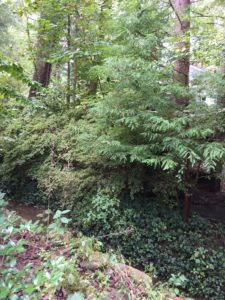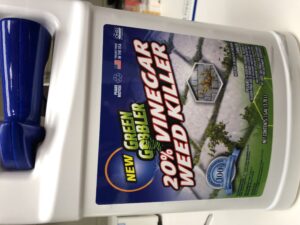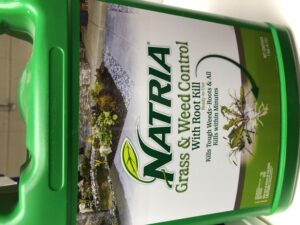Eco-Friendly Herbicides – a New Era in Home Weed Control
go.ncsu.edu/readext?957450
en Español / em Português
El inglés es el idioma de control de esta página. En la medida en que haya algún conflicto entre la traducción al inglés y la traducción, el inglés prevalece.
Al hacer clic en el enlace de traducción se activa un servicio de traducción gratuito para convertir la página al español. Al igual que con cualquier traducción por Internet, la conversión no es sensible al contexto y puede que no traduzca el texto en su significado original. NC State Extension no garantiza la exactitud del texto traducido. Por favor, tenga en cuenta que algunas aplicaciones y/o servicios pueden no funcionar como se espera cuando se traducen.
Português
Inglês é o idioma de controle desta página. Na medida que haja algum conflito entre o texto original em Inglês e a tradução, o Inglês prevalece.
Ao clicar no link de tradução, um serviço gratuito de tradução será ativado para converter a página para o Português. Como em qualquer tradução pela internet, a conversão não é sensivel ao contexto e pode não ocorrer a tradução para o significado orginal. O serviço de Extensão da Carolina do Norte (NC State Extension) não garante a exatidão do texto traduzido. Por favor, observe que algumas funções ou serviços podem não funcionar como esperado após a tradução.
English
English is the controlling language of this page. To the extent there is any conflict between the English text and the translation, English controls.
Clicking on the translation link activates a free translation service to convert the page to Spanish. As with any Internet translation, the conversion is not context-sensitive and may not translate the text to its original meaning. NC State Extension does not guarantee the accuracy of the translated text. Please note that some applications and/or services may not function as expected when translated.
Collapse ▲
English ivy is highly invasive, invading woodlands and choking out native plants. You can hand pull it but this is very labor intensive and may not be entirely effective.
Weeds are plants that grow where we do not want them. There are many plants that were brought to this country that are now escaped invasive plants. How do we control weeds without using harsh chemicals? Invasive plants deposit seeds in soils and these seeds will continue to emerge for years.
Controlling Weeds Without Herbicides
Controlling weeds without herbicides requires can be difficult and time consuming and often less effective than herbicides. Physically pulling, hoeing or mowing weeds can over time kills weeds. However, this usually takes several years effort and may not be effective in the long run.
In lawns mowing grass taller and keeping turf healthy can prevent weeds. Weed barriers can be made from household items such as newspaper or cardboard. These items kill and prevent weeds by preventing sunlight from getting to growing plants and smothering weeds. Avoid using plastics or cloths as these end up becoming environmentally unfriendly waste at some point.
Homemade Herbicides
Some home recipes for herbicides are just scary. Avoid using gasoline, diesel, kerosene, oil products, solvents, etc. in your landscape as herbicide. Petroleum products may kill plants but they can lead to fires and pollution.
Any substance that would kill living organisms in general can be used to kill weeds. Dish soap, vinegar, boiling water, bleach, salt, borax, baking soda, alcohol, and lots of other chemicals can be found on the internet as recommended herbicides. We do not recommend using homemade herbicides. Substances like vinegar and bleach are acids and can damage eyes and irritate skin. Scalding from boiling water causes a high number of home injuries annually.
Eco-friendly Herbicides – A New Era in Home Weed Control
If you do not want to use herbicides such as glyphosate and 2,4-D, select one of the new eco-friendly EPA-registered herbicides that are widely available today. Some of these herbicides are even formulated with home products such as vinegar. Just remember, every chemical whether it is a household cleaner or a pesticide, should be used with caution. When it comes to pesticides each is labeled and you are required by EPA regulations to read the label before you use the product.
Alternative Weed Control Products
- oils (clove oil, eugenol, and d-limonene)
- soaps (pelargonic acid)
- acids (acetic, citric)
- iron compounds (chelates).
All of these breakdown the leaf cuticle and dry out leaves. These “burn-down” herbicides act quickly but do not kill the roots so plants often come back. These work best on young plants.
Essential oil herbicides
- WeedZap (45% clove oil + 45% cinnamon oil)
- Bioganic Broadleaf Killer (2% clove and thyme oil; 1% sodium laurel sulfate; 10% acetic acid)
- Burnout II (12% clove oil, 8% sodium laurel sulfate, vinegar, citric acid)
- EcoSmart Weed and Grass Killer (sodium laurel sulfate and eugenol; 2-phenethyl propionate)
- GreenMatch EX (50% lemon grass oil)
- Repellex Weed-A-Tak (8% clove oil; 8% cinnamon oil; 4% citric acid)
Citrus oil-based herbicides
- Avenger
- GreenMatch (55% d-limonene)
- Worry Free Weed and Grass Killer (70% citrus oil)
- Acid-based herbicides
- WeedPharm (20% acetic acid)
- AllDown (23% acetic acid; 14% citric acid)
- C-Cide (vitamin C-based product)
- Natural Guard (citric acid and soybean oil)
Fatty acid-based herbicides (aka herbicidal soaps)
- Scythe
- Safer Moss and Algae Killer
- Safer Fast Acting Weed and Grass Killer
- Monterey Herbicidal Soap
- Natria Weed and Grass Killer
Iron HEDTA herbicides
- Bayer Advanced Natria Lawn Weed Control 26.5% (concentrate)
- Fiesta Turf Weed Killer 26.5% (concentrate)
- Iron-X Selective Weed Killer for Lawns 26.5% (ready to use)
- Ortho Elementals Lawn Weed Killer 1.5% (ready to use)
- Whitney Farms Lawn Weed Killer 1.5% (ready to use)
*Inclusion of product names neither implies effectiveness, nor endorsement by the author or NC State University. Not all products described may be locally available, and the active ingredient content may be changed by manufacturers. Read the label CAREFULLY and follow all label instructions whenever using any pesticides as required by the EPA.






